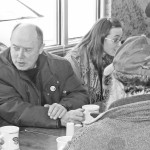Hadland addresses local concerns while visiting here
- Independent candidate Arthur Hadland has coffee with, and answers questions from constituents at A&W in Fort Nelson.
- Arthur Hadland and his daughter Marina purchase an audio description of the development of the Alaska Highway while at the Visitor Information Centre. Hadland’s father worked on the Alaska Highway in 1942. More on page 2. Photos by Kathy Smith
By Kathy Smith
Last week Area C Director Arthur Hadland met with community members and business owners to develop a sense of what the town is lacking. Hadland is running as an Independent candidate in the 2013 election in hopes of becoming the next Peace River North MLA. Health care services, rejuvenation of forestry, road upgrades, agricultural infrastructure, and the carbon tax were issues that stood out among those he spoke with.
Hadland says, “Number one was emergency services and the need to have better responsiveness…the real problem goes back to the Emergency Health Services Act which allows a centralisation of the (air) ambulance service in the lower part of the province, and that’s a real problem. There are other controls around unions, and the service is not very responsive to our communities, particularly to Fort Nelson, because you are so far up the province.” In addition to substandard access to emergency air transport, and the need for decentralisation of the service, the lack of maternity services and the requirement for more hospital staff to support a maternity ward were discussed.
“Forestry needs to be rejuvenated. You have to have more than a one-horse town, you have to have a few horses. Forestry is the logical one. You need to take forestry back and have manufacturing in Fort Nelson – no shipping it out of the region going south. It’s got to stay here. I think all the regional municipality needs to do is tell the ministry they want to take control of that resource and ensure that it’s managed to support the community. Right now the terms and conditions of the original tenure have not been honoured, they’ve been dishonoured, so it’s time to take back those licences and either encourage a company to come and operate under the licenses or set up your own cooperative structure,” says Hadland. With quality wood in the area he adds, “Why should you let somebody ship it south or overseas, I think it’s deplorable. We’ve got to act like we are the owners of Fort Nelson, just like we’re owners of British Columbia. That ownership means taking charge of the facilities and infrastructure giving us a strong, viable, and sustainable community.”
Recognising how the economy in Fort Nelson is suffering, Hadland says, “I’ve never seen the town so flat – I think it’s about party policy from southern BC toward northern BC. That’s why I’m running as an Independent. I think I can respond to the communities by developing policies that interest the north, in particular Fort Nelson.”
In terms of road infrastructure Hadland says, “I really got strong input that the 317 Road (Highway 77/Liard Highway), needs to be widened with a good back slope up to the Fort Nelson River, and a bridge put in across the river to replace the 1942 Bailey Bridge. Also, you need better access to and from the Horn River Basin by getting the Centre Line Road constructed.”
In addition, Hadland supports an airport expansion as long as Fort Nelson would see a direct benefit; “Right now it’s used to bypass Fort Nelson with the fly-in fly-out model to the gas developments.
Also industry has to step up to the plate and build medium priced housing for staff here – they can’t just keep riding on our resources and taking them away, it has to be brought back to our community.”
Hadland feels natural gas is not being developed to benefit the community or the province in the way it should be; “I think we have a resource and we’re giving it away without ensuring it looks after northern communities. We need to have refineries built in the north and the concept of co-generation will provide employment – using our natural gas for our own energy needs, which is much more economical than any other at the present time.”
On the need for agricultural infrastructure and food sustainability in the area, Hadland says “There’s got to be some kind of buy-in from the community to use the local products – there’s a need to foster this.”
Particular to Hadland’s platform is doing away with the carbon tax; “Right now it’s collected on the pre-text that we’re going to be saving the environment. The Clean Energy Act said natural gas was bad for the environment, but now because of the big power sources needed for the LNG, they’ve all of a sudden called co-generation, the development of electricity through natural gas, clean, as long as it’s used for the export of liquid natural gas. The whole policy is totally hypocritical. The problem is accumulated taxes that come from the carbon tax are actually double the income from the royalties on natural gas – that money is given out to the likes of Canfor, Encana, and others with the idea that they are supposed to innovate by having a carbon reduction in all of their business activities – that comes off the backs of individual tax payers and it goes to big business.”



 Follow
Follow



Recent Comments